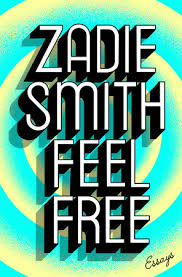Feel free to soak up Zadie Smith's brilliance
Let's open with a word of praise, first, for the Seattle Public Library's Peak Picks program, which places copies of popular titles in neighborhood library branches on a first-come, first-serve basis. It's the perfect antidote to those long lists of holds that vex library users who want to read the hottest, newest titles on their release. The program encourages readers to visit their local library often, and it encourages high circulation numbers, and it gets hot new books into more hands.

Over the weekend, I bumbled across a Peak Picks edition of Feel Free, Zadie Smith's newest book of essays, in a small SPL branch. Smith is one of those rare authors who is so well-regarded that her publisher doesn't bother to send review copies to any but the most elite outlets, and so Feel Free hadn't yet crossed my desk. I checked out the book, and basically inhaled it in a day.
Smith is one of the finest novelists of her generation, but her essays are underappreciated. This happens to the highest-profile literary authors on a regular basis, for some reason. It took almost a generation, for example, before David Foster Wallace's essays were acknowledged as their own body of work - one as valuable or even more valuable than his fiction.
If you were to read only one of Smith's essays in this book, I'd direct you to "Generation Why?," her contemplation of Facebook, David Fincher's film The Social Network, the books of futurist Jaron Lanier, and much more. Smith's regard for Mark Zuckerberg feels genuine, and so does her terror at his clear-eyed contempt for humanity. "You want to be optimistic about your own generation," Smith writes, but there's also a special brand of loathing that you reserve for your own peer group. "Generation Why?" pivots between optimism and loathing so deftly that you might not feel the sway and churn of Smith's writing until you pass over it a second or third time.
Even the minor pieces in Feel Free are major. A glossy profile of Jay-Z, for instance, is still as full of brilliant observation as any Alice Munro story. And the pieces on Brexit that open the book feel as immediate as anything printed in this morning's newspaper.
Look, you don't need me to tell you to read the new Zadie Smith book. A review would be unnecessary - like slapping an Instagram filter on a photograph of the Lincoln Memorial. Anything I can write about Smith's writing feels useless - additive for the sake of being additive. But you should know that this book is out there waiting for you to pick it up. One of our finest literary minds has some new thoughts for you to read, and read it you should. It's as easy as dropping by your neighborhood library.